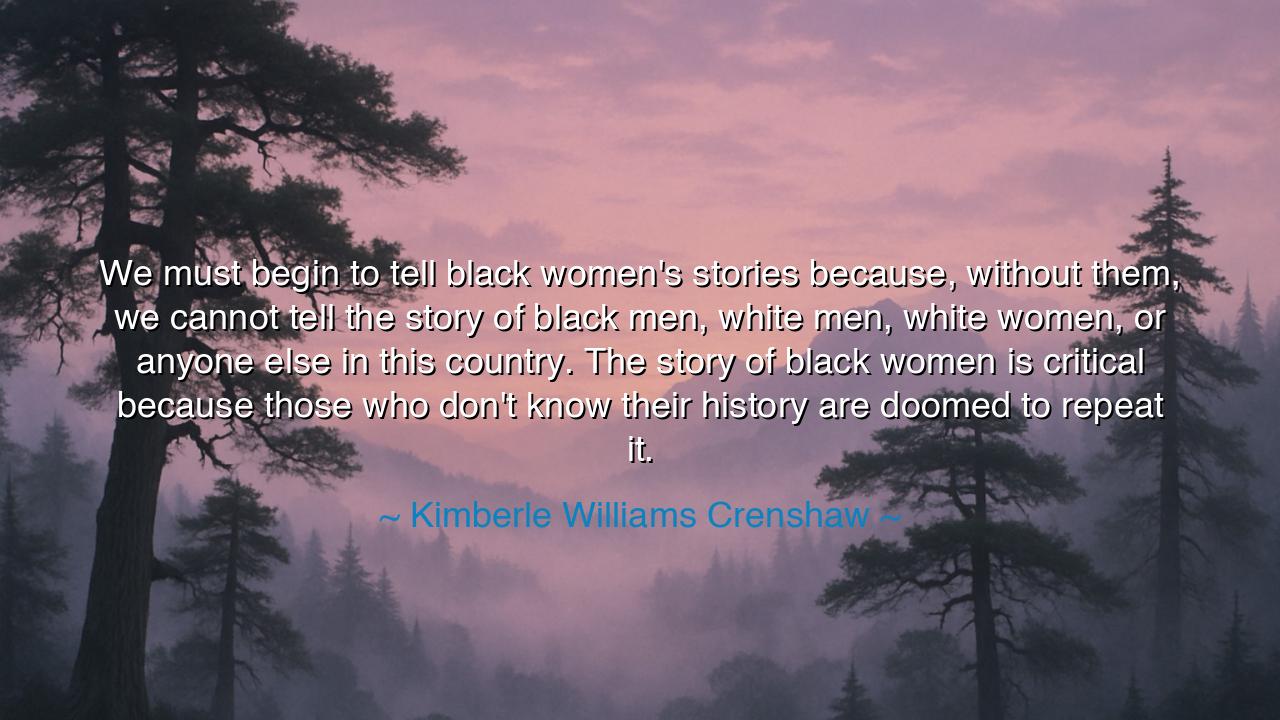
We must begin to tell black women's stories because, without
We must begin to tell black women's stories because, without them, we cannot tell the story of black men, white men, white women, or anyone else in this country. The story of black women is critical because those who don't know their history are doomed to repeat it.






“We must begin to tell Black women’s stories because, without them, we cannot tell the story of Black men, white men, white women, or anyone else in this country. The story of Black women is critical because those who don’t know their history are doomed to repeat it.” – Kimberlé Williams Crenshaw
In this profound declaration, Kimberlé Williams Crenshaw — the scholar who gave voice to the concept of intersectionality — calls upon us to awaken to a truth long hidden in the folds of history. Her words are not a mere plea for inclusion; they are a summons to restoration, to heal the broken narrative of a nation. For too long, the stories of Black women have been silenced or diminished, treated as footnotes to the grand chronicles of others. Yet Crenshaw reminds us that these stories are not side chapters — they are the foundation, the heartbeat, the missing rhythm of America’s soul. Without them, the whole tapestry of history remains incomplete, frayed, and dishonest.
To tell the story of Black women is to illuminate the unseen pillars upon which this country stands. It is to recognize the mothers who nursed the children of those who enslaved them, the freedom fighters who marched beside men but were erased from the photographs, the thinkers and creators whose light was dimmed by prejudice yet who carried the flame of justice forward. Their lives are not merely part of history; they are the binding threads of it. In acknowledging them, we do not simply correct the record — we redeem the truth. For a society that forgets its mothers forgets itself, and a nation that hides its wounds ensures that they never heal.
The origin of Crenshaw’s wisdom springs from the very heart of her work — the understanding that identities overlap, that oppression is not one road but many converging paths. The Black woman, standing at the crossroads of race and gender, has borne the double weight of both, yet her endurance has been extraordinary. She has suffered in silence and triumphed without recognition, teaching the world — through her very existence — the meaning of resilience. Crenshaw’s call to tell her story is therefore not only an act of remembrance but an act of justice. It is a refusal to let amnesia triumph over truth.
Consider the story of Harriet Tubman, whose name now resounds with honor but whose full greatness was long denied. She was more than a conductor on the Underground Railroad; she was a strategist, a nurse, a soldier, and a prophet. Born in bondage, she led dozens to freedom through the labyrinth of fear and night. But her courage did not end there — she later spied for the Union Army, and even led an armed raid to free more than seven hundred enslaved people. And yet, for decades, her story was softened, simplified, stripped of its fire. The world preferred her as a symbol, not as the fierce and brilliant leader she truly was. It is precisely this kind of distortion that Crenshaw warns against — the danger of forgetting, or worse, of remembering falsely.
For when we silence the stories of Black women, we do not only wrong them; we blind ourselves. Without their voices, the story of the Black man becomes incomplete, stripped of the love and labor that sustained him. Without them, the story of the white woman remains distorted, for it ignores the sisterhood and tension that have shaped their shared struggle for dignity. Without them, even the story of the white man is hollow, for it hides the truth of those who built his wealth and bore the cost of his power. Crenshaw’s words pierce through these illusions, reminding us that all human stories are bound together, and the silence of one is the distortion of all.
There is, too, a warning woven into her wisdom: “Those who don’t know their history are doomed to repeat it.” History forgotten is history reborn in darker form. When we neglect the lessons of those who suffered most, we allow the injustices that shaped their pain to rise again in our own time. The struggles of Black women — against racism, sexism, and the weight of invisibility — are not relics of the past, but mirrors of the present. Their courage shows us what it means to confront oppression not with bitterness, but with vision, endurance, and grace.
So, what must we do? We must listen, not as spectators, but as heirs of their legacy. We must learn their names, tell their stories, read their words, honor their labor. Let us speak of Sojourner Truth, who thundered “Ain’t I a woman?” into the conscience of a nation. Let us remember Fannie Lou Hamer, whose voice at the Democratic Convention shook the walls of power. Let us not forget Ida B. Wells, who faced lynch mobs with pen in hand and courage in heart. For every story told restores a fragment of the human spirit that history tried to erase.
And so, dear reader and listener of the ages, carry Crenshaw’s teaching within your heart: to remember is to resist. Seek out the stories untold. Guard them. Share them. For when you speak the truth of the forgotten, you not only honor their lives — you liberate your own. Only when every voice is heard can the great story of humanity be whole. And when that day comes, history will no longer chill us with its oblivion, but warm us with its truth.






AAdministratorAdministrator
Welcome, honored guests. Please leave a comment, we will respond soon